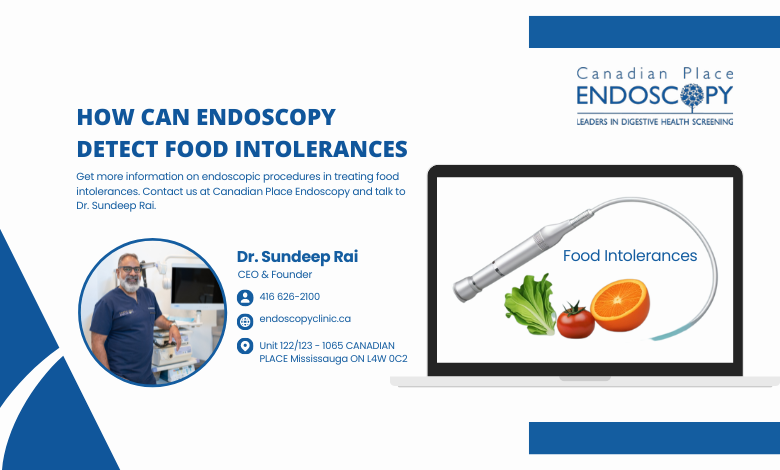How Can Endoscopy Detect Food Intolerances

It is common for any individual to feel uneasy after eating food that doesn’t go well with their tummy. They experience the symptoms of gas, bloating, and diarrhea. These symptoms disturb the routine of daily life, and the individual has to invest time, energy, and money to get the treatment. There is a prevailing belief that food intolerances are the reason for these gastric problems. However, there might be different or more critical underlying concerns that are the reason for the health problems. Doctors may advise undergoing endoscopic procedures to identify stomach-related illnesses and symptoms.
Knowing the Difference Between Food Allergies and Intolerances
Food allergy vs. food intolerances. The difference between the two is distinct. Food allergies can lead to critical health concerns and generate major immune system responses. On the other hand, food intolerances impact the digestive system. They are less severe than food allergies in most of the individual cases. While endoscopy cannot accurately diagnose food allergies, it can certainly provide information on food intolerance.
If you assume that you are allergic to certain types of foods, then you can write down the foods that you take to find out which ones are causing those symptoms. Depending on the outcome of the event that has happened, one can be in a position to determine if one is an intolerant or an allergic person to a certain kind of food.
Food allergies can show up within minutes to hours. Symptoms may begin with a mouth and progress to vomiting, diarrhea, and stomach discomfort. They can also lead to asthma episodes, low blood pressure, and skin issues such as eczema or hives. Doctors may use skin and blood tests to identify allergies. The straightforward approach to managing food allergies is avoiding the foods that trigger them.
Get more information on endoscopic procedures in treating food intolerances. Contact us at Canadian Place Endoscopy and talk to Dr. Sundeep Rai.
Endoscopy’s Function in Identifying Food Intolerances
If you suspect you have certain foods that you cannot tolerate, endoscopy might be useful in this case. This medical procedure can diagnose the conditions of the human digestive tract. It must be noted that endoscopy cannot identify the precise food that is causing the intolerance. However, doctors at the best endoscopy clinic in Toronto can identify underlying disorders that may be contributing factors to these symptoms.
Here’s how to do it:
- Recognizing Inflammation: Endoscopy gives the visuals of the lining of the stomach, small intestine, and esophagus. The images can indicate persistent inflammation in certain regions. Some meals may cause this inflammation, which could result in symptoms that don’t go away.
- Identifying Coeliac Disease: This disease is one of the common food intolerance problems. It is an illness caused by an immune reaction to eating gluten. Coeliac disease can be identified by endoscopy as it can help display distinctive small intestine damage.
- Understanding Irritable Bowel Syndrome (IBS): Food intolerances are frequently linked to IBS. Endoscopy can rule out other disorders with comparable symptoms and assist in identifying whether inflammation is present, which can lead to IBS flare-ups, even though it cannot directly diagnose IBS.
- Evaluating Small Intestinal Bacterial Overgrowth (SIBO): SIBO is a disorder that causes the small intestine to overgrow bacteria, and it can lead to a variety of digestive problems. In addition to other testing, endoscopy can aid in the diagnosis of SIBO. SIBO can worsen symptoms and make it challenging to identify dietary triggers, even though it is not a food intolerance per se.
Limitations of Endoscopy in the Diagnosis of Food Intolerance
Endoscopy is not a definitive test for dietary intolerances. However, endoscopic procedures can help reveal critical details of the digestive tract. It cannot identify particular foods as triggers. Additional testing, such as food challenges or exclusion diets, may be required to identify the precise foods causing issues.
It’s important not to dismiss endoscopic procedures altogether or consider them a solution for food intolerances. You should seek other approaches to get a better outlook on food intolerances. Food intolerance diagnosis frequently calls for a multimodal approach. Apart from endoscopy, further diagnostic methods and instruments comprise:
- Blood tests: Helps in tracing antibodies or indicators of inflammation.
- Breath tests: Measure the concentrations of specific gases in the breath that indicate digestive problems.
- Food Diaries: Keep a note of symptoms and possible food triggers with food diaries.
- Diets based on elimination: To find foods that might be problematic, eliminate them from the diet and then progressively add them back.
The Value of Seeking Advice from a Medical Professional
Seeking medical advice is crucial if your digestive troubles are bothering you regularly. They can help you through the diagnosis procedure and decide whether an endoscopy or other tests are required. Although endoscopy may not be the only method for identifying food intolerances, it is an important test for identifying digestive tract disorders. You can improve your gut health by visiting Canadian Place Endoscopy, the best endoscopy clinic in Toronto. Food intolerances can be identified and treated with the help of medical professionals like Dr. Sundeep Rai.
Keep learning, keep growing. Explore more in our articles.







